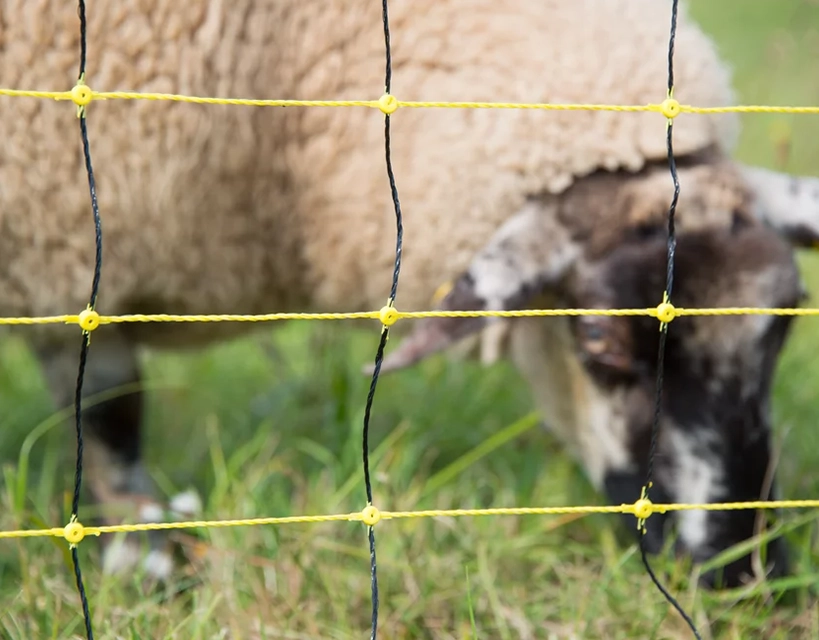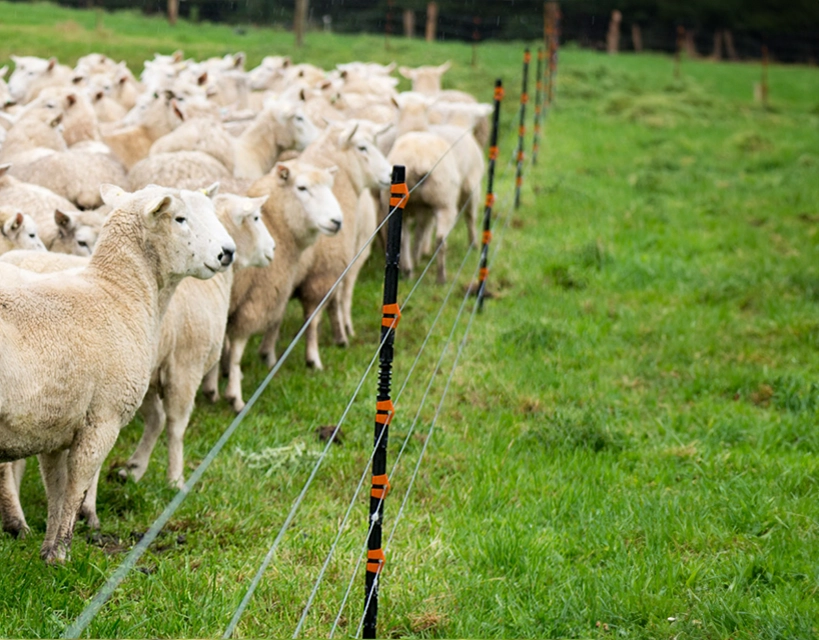Sheep Conductor Buyer's Guide
|
Conductors for sheep
|
Visibility: Sheep need to clearly see the fence to avoid running into it. Use brightly coloured or wide tape, which is more visible than thin wire. This is especially important because sheep are flight animals.
Conductivity: Use conductor materials with high conductivity (e.g., high-tensile wire, electric tape) to ensure the fence delivers an effective shock even when your flock of sheep has thick wool fur.
Fence Type: Depending on whether you want to set up a permanent fence or a mobile fence, different materials may be suitable. Electric tape is ideal for mobile fences as it is cost-effective, quick to install, and easy to roll up. For added convenience during installation, we recommend using fencing reels. Fencing wire is recommended for permanent fences. Although the installation effort is somewhat higher, this ensures that the fence remains intact for the long term. The material is highly conductive and, depending on the model, particularly weather-resistant and durable due to its aluminium coating. For an easier option, consider using sheep netting or the practical SmartFence.
Our recommendations for sheep fences:
Electric Tape: Our tape is our top choice for electric sheep fencing. It can be used for both mobile and permanent fences, with various widths available. 12.5mm and 20mm are ideal for mobile fences, while 40mm is best for a permanent setup. The tape consists of electrical conductors made from stainless steel and copper, wrapped with white or coloured plastic fibres. The stainless steel ensures high tensile strength, while the copper offers excellent conductivity. Sheep can see this material well, reducing the risk of injury.
Fencing Wire: This conductor material consists of galvanised steel wire. Depending on the application, various diameters from 1.6mm to 2.0mm are available.
Wire Strands: This highly conductive material comprises seven galvanised wire strands that are intertwined. Due to their low resistance, wire strands are suitable for long, permanent sheep fences.
Wire (High Tensile): High Tensile is the best fencing wire in our range and is ideal for permanent sheep fences. The zinc-aluminium alloy makes the wire highly conductive and particularly corrosion-resistant. The aluminium layer around the core ensures a conductivity that is up to 15 times higher than that of standard wires. With additional steel springs and fence tensioners, you can tension High Tensile wire so tightly that post spacings of up to 20 metres become possible. We recommend High Tensile for permanent fencing, as the initial cost is higher but is offset by its excellent properties and a lifespan of up to 30 years.
Netting: Sheep netting can be particularly effective, providing both physical and electrical barriers while being easy to install and move.


The right insulators for sheep fences
Insulators should match the fence material used. There are insulators for strands, wires, and specialty wire. Pay attention to the intended use and the material of the posts.
They are made from durable materials such as plastic, rubber, or ceramic, and they insulate the conductor from the posts, preventing unwanted power leakage. Plastic insulators are the most common, as they are lightweight, weather-resistant, and cost-effective. Plastics like polyethylene or polypropylene are often used because they are weather-resistant and durable.
Ceramic insulators offer very high insulation capability and are particularly resistant to extreme weather conditions, though they are also more expensive and heavier. For this reason, they are often used as strain and corner insulators, as they are especially well-suited to handle the forces in these areas.
For sheep fences, ring insulators, W-insulators, and wire clips are particularly suitable.
BARBED WIRE? PLEASE DON'T! We advise against using barbed wire as a pasture fence for sheep. Barbed wire can cause serious injuries to the animals if they try to push through the fence and get tangled with their wool.
Our manufacturers for high-quality conductor material:
- Gallagher, e.g., for high tensile wire, wire strands, electric strands
- Pulsara, e.g., for affordable pasture wire
- Euronetz and Horizont, e.g., for sheep nets
|
Select your conductor material in just 3 steps
Coming Soon If you have any questions or would like personalised advice, we are happy to assist you.
|
